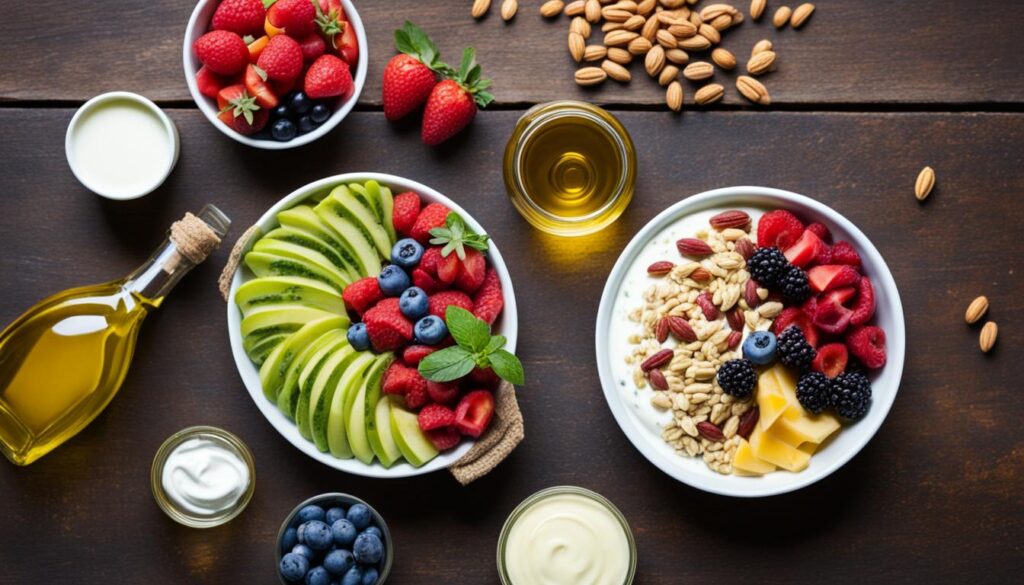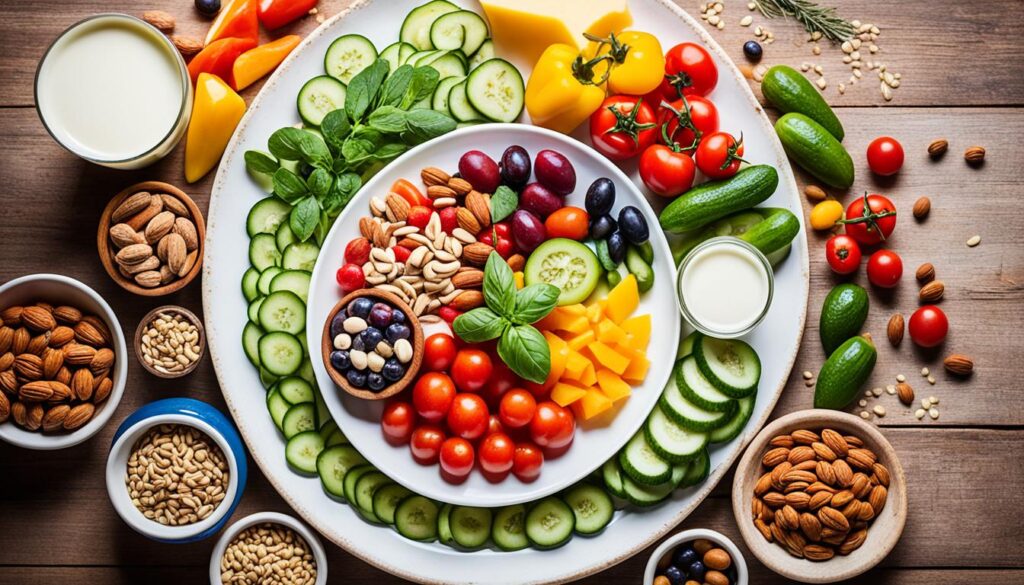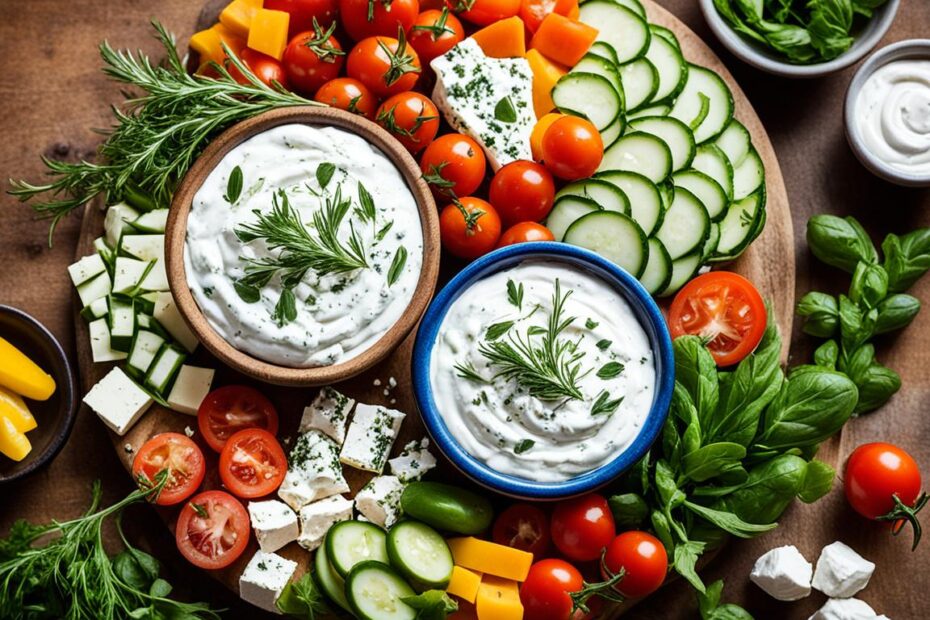Intriguing, isn’t it? If you’re into the Mediterranean diet, dairy might puzzle you. Is it a yes or a no? Let’s check out dairy’s deal in the Med way of eating.
The Mediterranean diet loves plant foods and likes dairy a bit. It is big on fruits, veggies, grains, olive oil, and fish. Dairy like cheese, yogurt, and milk is there but not too much. This balance is key to the Med diet.
What is the Mediterranean Diet?
The Mediterranean diet is from countries around the sea. Places like Greece, Italy, and Spain eat this way. They focus on eating lots of plants, including fruits, veggies, and nuts. Olive oil is a big part of this diet.
Plant-Based with Moderate Dairy Consumption
This diet is mostly about plants but does have some dairy. People eat cheese and yogurt a lot. They also enjoy seafood and chicken, with just a little red meat. This way of eating gives the body many needed vitamins and keeps it healthy.
The Mediterranean diet is known all over as very good for you. The Dietary Guidelines for Americans say it’s perfect for health and fighting diseases.
People living near the Mediterranean Sea often eat like this:
- They love olive oil and use it a lot.
- They eat lots of fruits, vegetables, whole grains, legumes, nuts, and seeds.
- While they enjoy cheese and yogurt, they don’t have much.
- They have fish and seafood often.
- Eating much red meat or processed meat isn’t common.
- Drinking a little wine with meals is okay.
Folks who follow the Mediterranean lifestyle eat a tasty and healthy diet. This way of eating helps them live longer and feel better.

Health Benefits of the Mediterranean Diet
The Mediterranean diet is famous for keeping people healthy. Many studies have shown its good effects on our bodies. It helps more than just with losing weight.
This diet is great for your heart. It can lower the risk of heart problems. Good fats in olive oil and nuts can help your heart work better.
It also helps with sugar and stops type 2 diabetes. Eating whole grains, veggies, fruits, and lean meat keeps your blood sugar in check. It helps your body use insulin better.
Some research says it can help you stay a healthy weight. Eating fresh, not a lot, and nuts helps you feel full. This can lead to losing weight over time.
The diet might also lower the chance of some cancers like breast and colon. This is because of the diet’s good nutrients and their job to protect us.
Following this diet can also make your brain work better. Foods like fish, nuts, and greens are good for your mind. They can keep you from losing memory as you get older.
So, the Mediterranean diet is full of good things for your health. It helps with your heart, sugar, weight, and might protect you from cancer and memory loss. It’s a smart choice for a better life.

Role of Dairy in the Mediterranean Diet
The Mediterranean diet focuses a lot on plant-based foods. Yet, it also lets dairy products like cheese, yogurt, and milk be a part. They are included for a balanced meal plan.
Moderation is Key
This diet says eat dairy that’s not super processed. Think of feta cheese, Parmesan, and Greek yogurt rather than the kind that’s high in fat. It’s best to not have too much dairy each week, only a few servings.
And there’s science to back up this dairy advice. A study on the “MedDairy” diet showed it cut heart disease risk. People saw better blood pressure, heart rate, and cholesterol with 3-4 dairy servings daily.
Normally, the Mediterranean diet gives less calcium than the U.S. recommends. Adding dairy can help make up this difference. The USDA suggests three dairy servings daily for people 8 and older.
Adding dairy to the Mediterranean plan balances it out. This way, you get all the key nutrients while sticking to a diet good for your heart.
does mediterranean diet include dairy
The Mediterranean diet focuses a lot on plant-based foods. But, it also includes dairy in a healthy way. I wanted to know more about dairy in the Mediterranean lifestyle.
In the Mediterranean diet, dairy is used but not a lot. People mostly eat cheese and yogurt. They eat dairy products moderately. The amount of dairy people have can change in different places around the Mediterranean. But, they all try to not eat too much dairy.
Surprisingly, people don’t drink much milk in the Mediterranean diet. They prefer cheese and yogurt. These are better for the body and give more good stuff.
So, yes, the Mediterranean diet does have dairy. But, the main foods are from plants. Dairy is just part of the diet in a small way. This helps give you many nutrients and is good for your health.
I find the way the Mediterranean diet uses dairy interesting. It shows how eating a mix of foods in the right amounts is good. The diet is a good model for staying healthy.
Types of Dairy Suitable for the Mediterranean Diet
When you’re on the Mediterranean diet, picking the right dairy is key. You should aim for low-fat or non-fat options. This diet is all about balance and choosing dairy wisely.
Feta cheese is a top pick for this diet. It’s tangy and crumbly, perfect for salads and pasta. Use it as a topping on many Mediterranean meals. Parmesan and mozzarella are good too because they are low in fat. They fit well in many Mediterranean dishes.
Greek yogurt also does well in the Mediterranean diet. It’s thicker and creamier than regular yogurt. Plus, it has more protein. Add it to dips, marinades, or enjoy with fruits for a tasty, healthy snack.
While dairy is okay in this diet, use it carefully. Stay away from high-fat options like cream and full-fat cheese. Remember, the Mediterranean diet is about being smart with your choices. Choose dairy that’s low in fat and not heavily processed for the best results.
Alternatives to Dairy in the Mediterranean Diet
If you love the Mediterranean diet but want to cut back on dairy, there’s good news. You can find many plant-based options that fit well. They not only offer good nutrition but also keep you true to the Mediterranean way, even without dairy.
One tasty choice is coconut milk. It’s a great substitute in dishes from the Mediterranean area. But remember, coconut milk has a lot of saturated fat. So use it in a healthy, balanced diet.
Almond, soy, and oat milk are other good picks for the Mediterranean diet. You can drink them or use them in your cooking. These milk alternatives are tasty in many recipes and dishes.
In the Mediterranean diet, there are lots of non-dairy foods to enjoy. Here are some examples:
- Nuts and seeds, like almonds, cashews, and chia seeds, provide good fats and protein.
- Legumes, such as chickpeas and lentils, give you fiber and plant protein.
- Whole grains, like quinoa and brown rice, are full of nutrients and great for meals.
With these alternatives, you can stick to the Mediterranean way while avoiding dairy. It’s all about a balanced, plant-based diet. This includes lots of different, healthy foods. Whether you choose dairy or not, there’s plenty to enjoy with this diet.
Incorporating Dairy into the Mediterranean Lifestyle
When you follow the Mediterranean diet, add dairy products carefully. Use items like cheese, yogurt, or milk in meals like salads and pasta. You can also have them as a snack with fruits and nuts. Choose low-fat or non-fat dairy, and have a few servings weekly.
Adding dairy to your Mediterranean routine lets you enjoy its goodness. The Mediterranean diet is all about balance. Eat dairy in small amounts with lots of plants, grain, and good fats. This way, you get the right mix of nutrients for your body.
For dairy in the Mediterranean way, go for less processed, low-fat, or non-fat choices. Keep your dairy servings few each week. This helps you savor dairy’s taste and goodness within the Mediterranean ideas.
